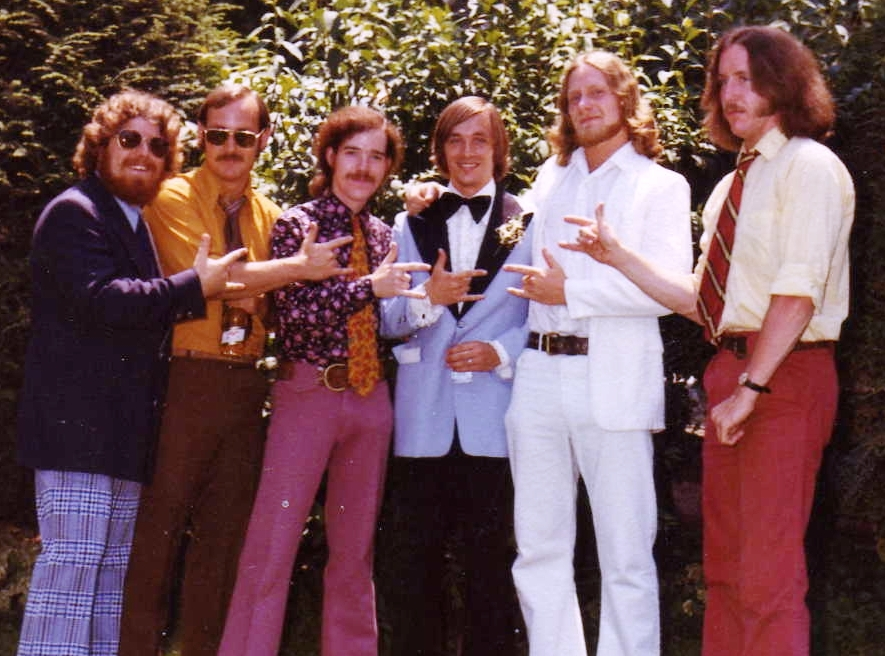
1970s band reunites
The rock band Sutton Ho, which formed at Marist in the early 1970s, got back together this past year — but only for dinner. They reunited in June at Keens Steakhouse in New York City.Sutton Ho was comprised of five Marist students: John Kaefer ’73 (drums), George Dawson ’71 (keyboards), Tom Meehan ’74 (bass), Kevin Dwyer ’72 (guitar), and Bob Coffin ’73 (vocals).After winning a band contest on campus, they played in clubs regionally in 1971 and 1972. They landed a much sought-after gig as the house band at the Mad Hatter in the Hamptons during summer 1972 before circumstances caused the band to fold in the fall of ’72.
24 Feb 2023
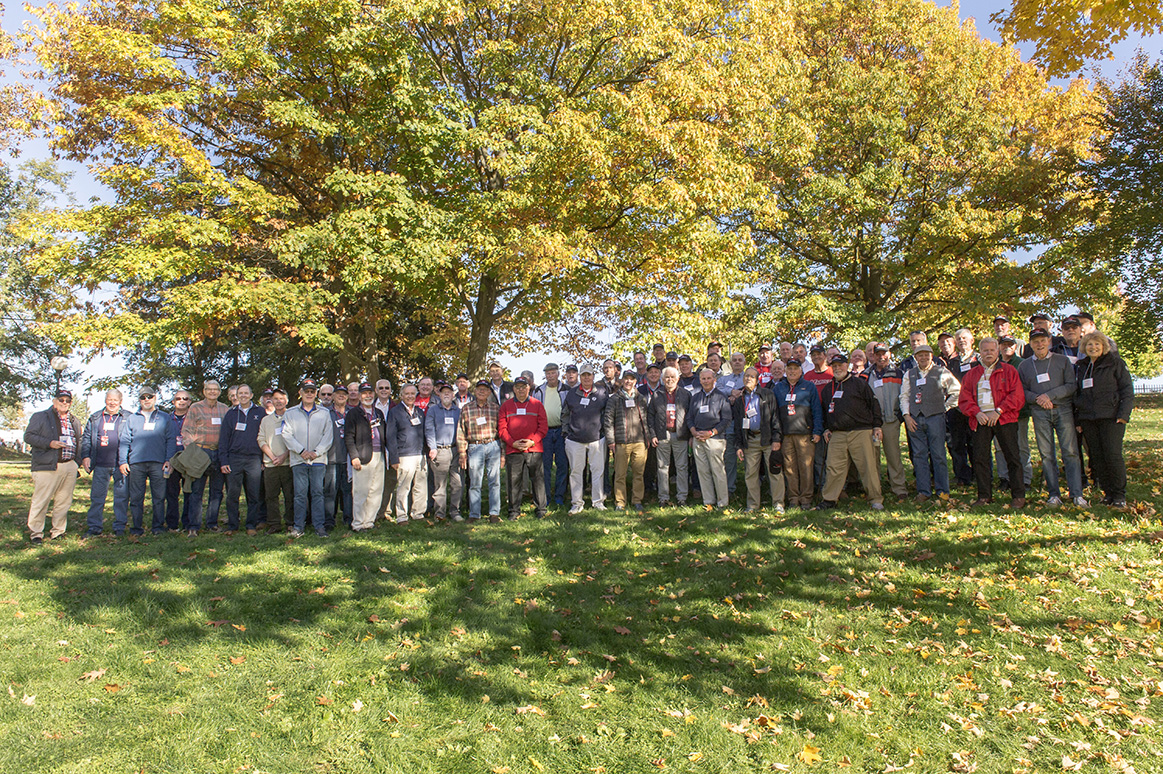
The event Oct. 28–30 featured reunion celebrations for the 25-, 30-, and 40-year classes, plus three 50th reunion classes — the Classes of 1970, 1971, and 1972.
Picture the perfect autumn day, a tailgate with food trucks offering fare ranging from tacos, empanadas, and fresh apple-cider doughnuts to lobster bisque, chicken, steak, and Liège waffles served out the window of a polished, vintage Airstream, capped off by a football game where the Red Foxes triumphed, and you have Marist Homecoming and Reunion Weekend 2022. The event Oct. 28–30, organized by the Alumni Office, featured reunion celebrations for the 25-, 30-, and 40-year classes, plus three 50th reunion classes — the Classes of 1970, 1971, and 1972 — due to the “pause” that COVID-19 put on celebrations the past two years. All alumni, even those not marking a reunion, were invited to attend.The weekend kicked off with a welcome luncheon for the 50-year classes on Oct. 28. The annual Alumni Awards presentation that evening honored Patrick D. Massaroni ’10, Patrice Connolly Pantello ’76, and Paul J. Browne ’71. For more about the awardees, visit https://www.youtube.com/playlist?list=PLyIx3idSkxJloJBfTtv5-IMBhCwqFCGu2Honored at the 13th annual Theatre Hall of Fame Induction were, left to right, (standing) Mark Giuffre ’85, Vinnie Begley ’70, (sitting) Justin R. Santore McManus ’10, Irene Elias ’17, and Victoria Kirichok-Pratt ’93.Activities Oct. 29 included receptions for student–athlete alumni, a cappella singers, other members of the Music Program, Center for Multicultural Affairs alumni, Marist Abroad alumni, Student Government Association alumni, and LGBTQ+ alumni. Marist’s theatre tradition was saluted at the 13th annual Theatre Hall of Fame induction. Honored for their outstanding contributions to theatre at the College were: Vinnie Begley ’70. Mark Giuffre ’85, Victoria Kirichok-Pratt ’93, Justin R. Santore McManus ’10, and Irene Elias ’17.That night, the Heritage Classes (1947–1966) and 50-year classes gathered for a reception and dinner in the Murray Student Center on campus. Meanwhile, the Class of 1982 took over Marist’s historic Cornell Boathouse and the Class of 1992 and the Class of 1997 each celebrated in downtown Poughkeepsie at the Academy and Refinery 51 respectively.On Oct. 30, Swimming and Diving alumni and their families and friends joined teammates, coaches and friends for breakfast and a round of golf at the 13th annual Swimming and Diving Alumni Golf Outing.Earlier in 2022, the Alumni Office held its first June Reunion Weekend. The 5-, 10-, 15-, and 20-year reunion classes were invited to campus June 11–12 to celebrate their milestone reunions. Activities included children’s games, Hudson River cruises, a Marist Poll presentation, campus tours, alumni kickball games, a Marist Fund donor reception, and a River Fest on the riverfront.
24 Feb 2023
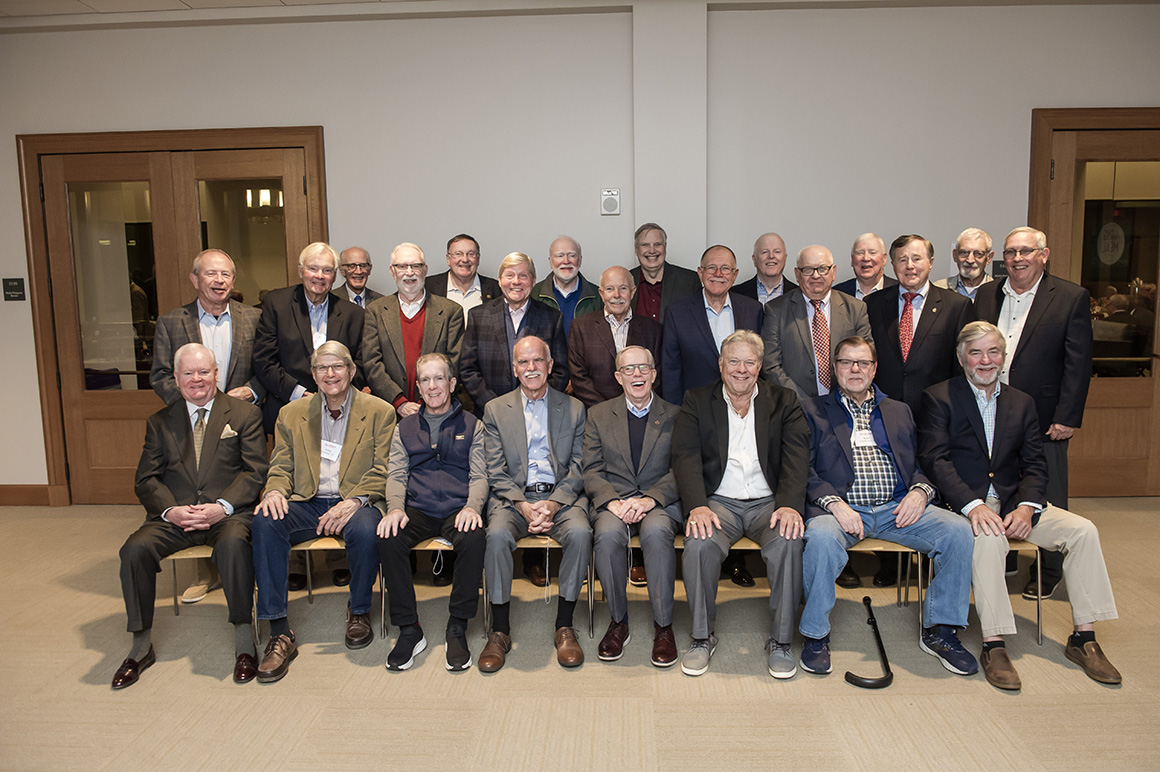
History is made as alumni from across the country return to campus for one special weekend.
Three classes gathered on campus in October to mark their half-century reunions. Alumni from locations across the country, including California, Illinois, Texas, Georgia, Florida, and Virginia as well as the Northeast, made their way to Poughkeepsie to reconnect with classmates, faculty, and members of the greater Marist community. Fifty volunteers served from one to three years on their respective reunion planning committees, reaching out to friends old and new. “Zoom” became a welcomed resource. The weekend featured receptions, campus tours, a football game, a tailgate, and a gala dinner. The Classes of 1970 and 1971 met their inaugural scholarship recipients, and the Class of 1972 launched its scholarship drive. Alumni who could not travel to the Hudson Valley were remembered through the many stories shared. A memorial service celebrated the lives and friendships of classmates. Deans provided updates on academic programs and new initiatives, underscoring the College’s commitment to providing an excellent liberal arts education. The campus offered spectacular views from all points—with smiles all arounhe Class of 1971 at their 50-year reunionMembers of the Class of 1971 celebrated 50 years since graduation.Members of the Class of 1972 reconnected at their 50-year reunion.
30 Mar 2023
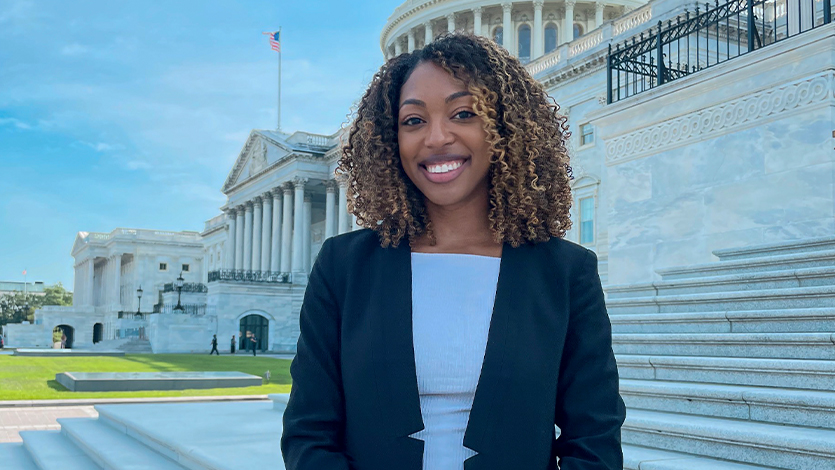
Danisha Craig ’18 made her mark in the Marist record books as a member of the track team. Now she is part of the team at the US Department of Energy, achieving her goal of a career in public service.
Danisha Craig '18 is a Senate legislative affairs advisor within the Department of Energy in Washington, DC.
08 Dec 2022

As of Jan. 1, 2022, through Jan. 20, 2023
AlumniDr. Martin A. Lang ’51Thomas F. O’Connor ’53Thomas G. Murphy ’55Joseph A. McKiernan ’56Joseph J. McGrath ’57Bro. Joseph Maura, FMS ’58Bro. Ernest G. Beland ’62Anthony V. Campilii ’62/’79MBAMaurice H. Lachance Jr. ’63Michael B. Feddeck ’66Michael J. Ward III ’66John J. Winkelman ’66Eugene J. Connors ’67John Hollingsworth ’68Capt. Paul X. Rinn ’68, USN Ret.Bro. Joseph P. Scanlon, FMS ’68Barry J. Fraser ’69Myron Korykora ’69Gary J. Lindstrom ’69Peter G. Bavis ’70Joseph T. Negler ’70Arthur J. Smith ’70William J. Spampinato ’70Dr. B. James Vaughan ’70Richard A. Belz ’71James A. Eaton ’71Robert Pavlovic ’71Patricia Rittenhouse ’71Cheryl C. Bradley ’72Dr. Brian J. Minasian ’72/’86MARichard J. Cairns ’73Laurie Clare ’73Frank J. Lovallo Jr. ’73John P. Zappe ’73Arthur G. Eichler ’74Ernest A. Arico Jr. ’76Clifford B. Schoonmaker Jr. ’76Hector L. Tejeda ’77Charles A. Schreck ’79James F. Kemmis ’80James A. Pagliaro ’80Barbara J. Schelin ’80Gary T. Steltz ’80James M. Doherty ’81Patricia Nishball ’81MBAThomas P. Riozzi ’81MBAJames V. Yardley ’81Sally J. Petro ’82Ruth E. Warren ’82Hiram Driscoll ’84MBAJeanmarie Arnold ’85Louis F. Cava ’85Kevin J. Breen ’87Karen Ely ’88Edward J. Gaus, MD ’88Daniel V. Greco ’89Robert A. Kenny ’89Lawrence P. Lay ’89Joseph J. Filardi Jr. ’91Matthew V. Phung ’91Bruce W. Thomason ’91Daniel H. Massey ’92Julie E. Pazera ’92Ronald L. Vece ’92Maureen E. Dobbs ’95Jeffrey P. Sullivan ’99/’02MBASarah J. McChesney ’00Carol L. Leasure ’02Douglas Knapp ’03Thomas D. Tavino ’03Brandon J. Ellerbee ’05Carl M. Hessick ’05MBAKristine N. Morgan ’09MALucas A. Benson ’10Jason M. Giani ’10Vincent J. Bocchino ’15Christopher M. Naughton ’16FriendsWilliam BarbashDr. Eileen BestPhilip K. Boyle Sr.Rev. Msgr. John BrinnPaul E. BurkeClaire CarlsonBarbara CarpenterLeo DenaultGeorge M. DowningMichael EffronElaine GreenspanDr. Joan E. HoopesJohn E. Mack IIIMichael MaletJ. Joseph McGowanSusan G. McHughVictoria PlataniaHerbert RedlSueAnn RedlMary RitzLillian SakkasMichael J. Tomkovitch, Esq.Timothy J. WillisEileen ZyskStaffDr. Pamela J. HarperTrusteesEllen M. HancockBro. Sean D. Sammon, FMS ’70
20 Jan 2023

Alumni work together on Olympics broadcasts.
Four Marist alumni worked on the 2022 Olympics for NBC in the network’s Stamford, CT, facility: Todd Bivona ’07, CJ Bottitta ’93, John Gilmartin ’75, and Kaare Numme ’00.
09 Dec 2022
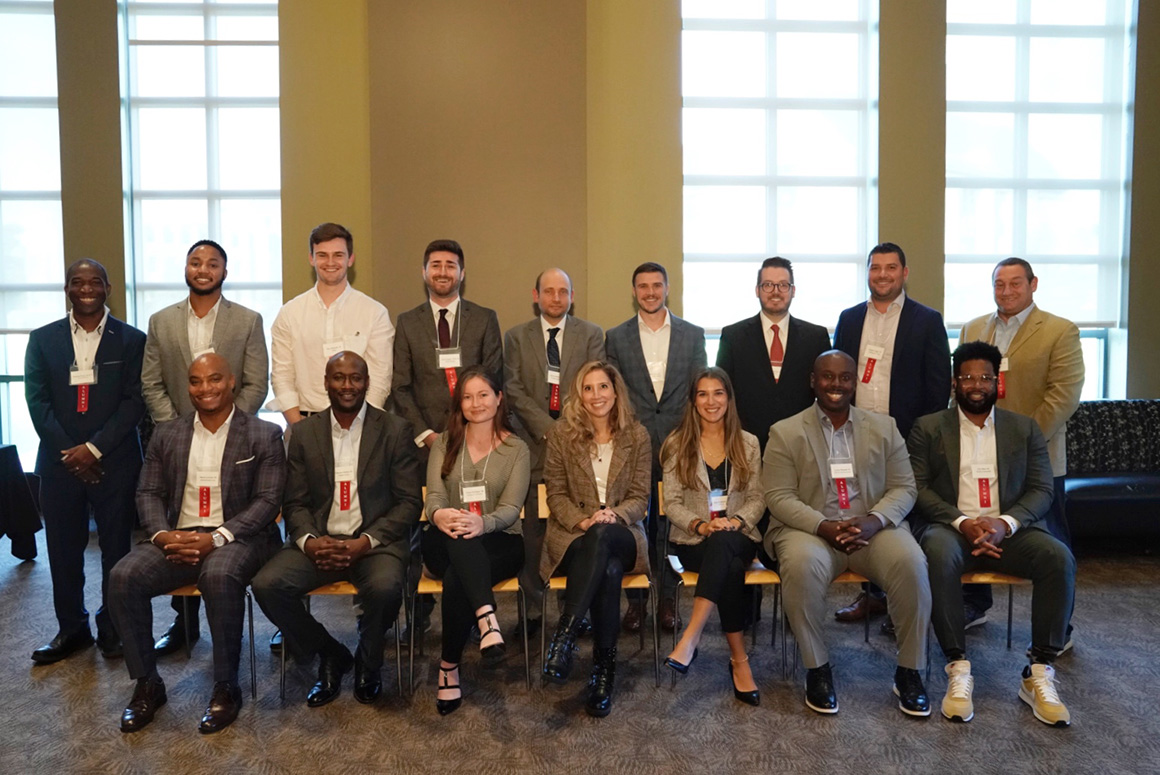
Marist grads return to campus to assist students in career pursuits
Alumni returned to Marist to meet one on one with students at the VIP Networking Event in fall 2022 presented by the Center for Career Services. The graduates gave students tips on finding internships and full-time jobs and succeeding in their career fields.
09 Dec 2022
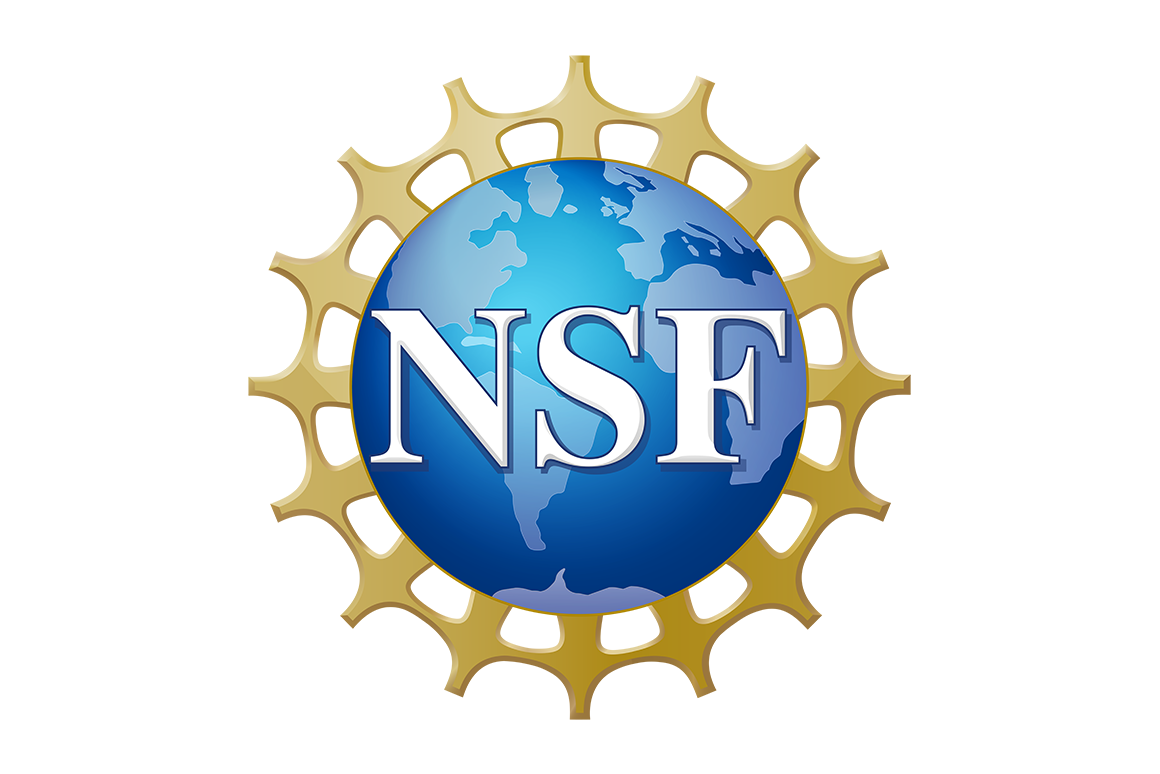
Helen Stahlin-Corveleyn ’00 was among 117 teachers, mentors, and mentoring organizations named as recipients of the national Presidential Awards for Excellence.
Helen Stahlin-Corveleyn ’00 was among 117 teachers, mentors, and mentoring organizations named by President Joe Biden as recipients of the Presidential Awards for Excellence in Mathematics and Science Teaching (PAEMST) and Presidential Awards for Excellence in Science, Mathematics and Engineering Mentoring (PAESMEM). The awards honor the important role that America’s teachers and mentors play in supporting learners who will be future STEM professionals, including climate scientists, mathematicians, innovators, space explorers, and engineers, according to a February 2022 announcement.Helen, who won in the Science category, teaches at Hopewell Elementary School in Hopewell, NJ. Her husband is Graig Corveleyn ’01.Established in 1983, PAEMST is the highest award that kindergarten through 12th grade mathematics and science (including computer science) teachers can receive from the U.S. government. Nominees complete a rigorous application process that allows them to demonstrate deep content knowledge and their ability to adapt to a broad range of learners and teaching environments. A panel of mathematicians, scientists, and educators at the state and national levels assesses the applications before recommending nominees to the White House Office of Science and Technology Policy (OSTP). Teachers are selected based on their distinction in the classroom and dedication to improving STEM education.The National Science Foundation, which manages PAEMST and PAESMEM on behalf of the White House Office of Science and Technology Policy, provides each recipient $10,000. Award recipients also receive a certificate signed by the president.
24 Feb 2023
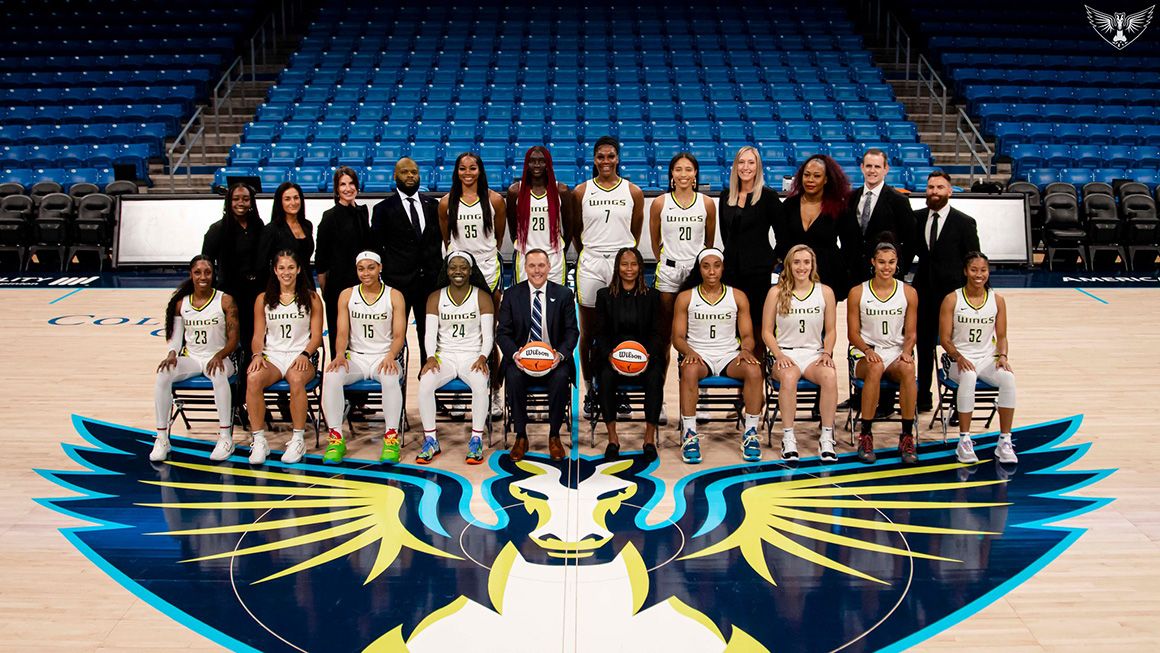
You might recognize the name Greg Bibb ’ 96 from when he called Marist basketball games — now he calls many of the shots as President, CEO, and Managing Partner of the WNBA Dallas Wings.
Greg Bibb ’96 always knew he wanted to be involved in sports. His love of athletics would take him from calling basketball games for Marist’s TV station all the way to serving as President, CEO, and Managing Partner of the WNBA’s Dallas Wings.“I had that sports aim and I felt that a communications degree with a concentration in radio, television, and film was the track to get there,” said Bibb, who, as an undergraduate, was the sports director for Marist’s TV station and covered sports for Marist’s newspaper, The Circle.Knowing the Marist internship program had contacts with the major sports networks, Bibb hoped he would earn a coveted internship if he worked hard enough. “I had that opportunity my junior year and had a chance to work on Monday Night Football and College Football Saturday,” he said. “It taught me so much about keeping up with a fast pace, working hard, and gave me that much more of a feel for the sports world.” He would one day be connected to an ABC Sports broadcast in a way he could never have imagined.“After Marist, I was able to take my sports background into a public relations opportunity with a soccer team and that actually forged a whole other path to grow in the industry,” he said. Eventually getting a chance to switch to the operational side, his roles have included executive VP of business operations of the NBA’s Washington Wizards and chief operating officer of the WNBA’s Washington Mystics. The latter he began in 2007 and then was in both roles starting in 2010. “I had the opportunity to try many things and learn from smart people,” he said.After later founding a sports-focused investment fund in 2013, he left basketball for a couple of years. A partner in the business, Bill Cameron, had an idea: come back and help him with his own WNBA team. “Getting back to being involved with the WNBA was a thrill,” Bibb said. “Bill was looking to move the Tulsa Shock to Dallas, the team today known as the Dallas Wings, and he asked if I would join the ownership group and lead the business.”“With the Wings, I’m in charge of all aspects of the organization. For example, growing our broadcast offerings… At one time, the team had a half dozen games on TV.” Referring to the 2022 season, he went on, “This past` year we played 36 games—and all 36 were broadcast. The telecast reaches all of Texas and Oklahoma, three-quarters of Arkansas, and half of Louisiana. That’s 11 million households that can see a Wings broadcast.”But one for ABC Sports, a playoff game against the Connecticut Sun on Aug. 21, was particularly momentous. “If you would have told me five years ago that we would be playing a playoff game on ABC before almost 800,000 viewers, I wouldn’t have believed you,” he said.But it’s more than the numbers for Bibb; it’s the hope. “I got involved with the WNBA to begin with partly because my wife, Tara, and I welcomed a baby girl,” he said. “This year is the 50th anniversary of Title IX and it’s important to create more opportunities for girls and women. My daughter has grown up around the WNBA and sees she can do anything she wants if she is willing to work for it. And it’s been just as important for our son … More opportunities need to exist for female athletes to be able to make a living professionally, and the success of the WNBA has a chance to help in that area.”Bibb, ever the competitor, doesn’t just have basketball nets on his mind, but lacrosse ones, too. He is also President, CEO, and Managing Partner of the professional lacrosse team Panther City Lacrosse Club, in Fort Worth, Texas. The team concluded its first season in the National Lacrosse League with high hopes in what he says is the fastest-growing city in the country, not to mention the 13th largest. “It combines the game of hockey that I played growing up and the game of basketball I’ve spent so much of my career in,” he said. “The participation rate in the sport keeps growing, there are cross-promotional opportunities with the Wings, and there’s the excitement of 20 to 30 goals a game on average. It’s another role for me that’s a great deal of fun…And, hey, isn’t fun what sports are all about?”
30 Jan 2023
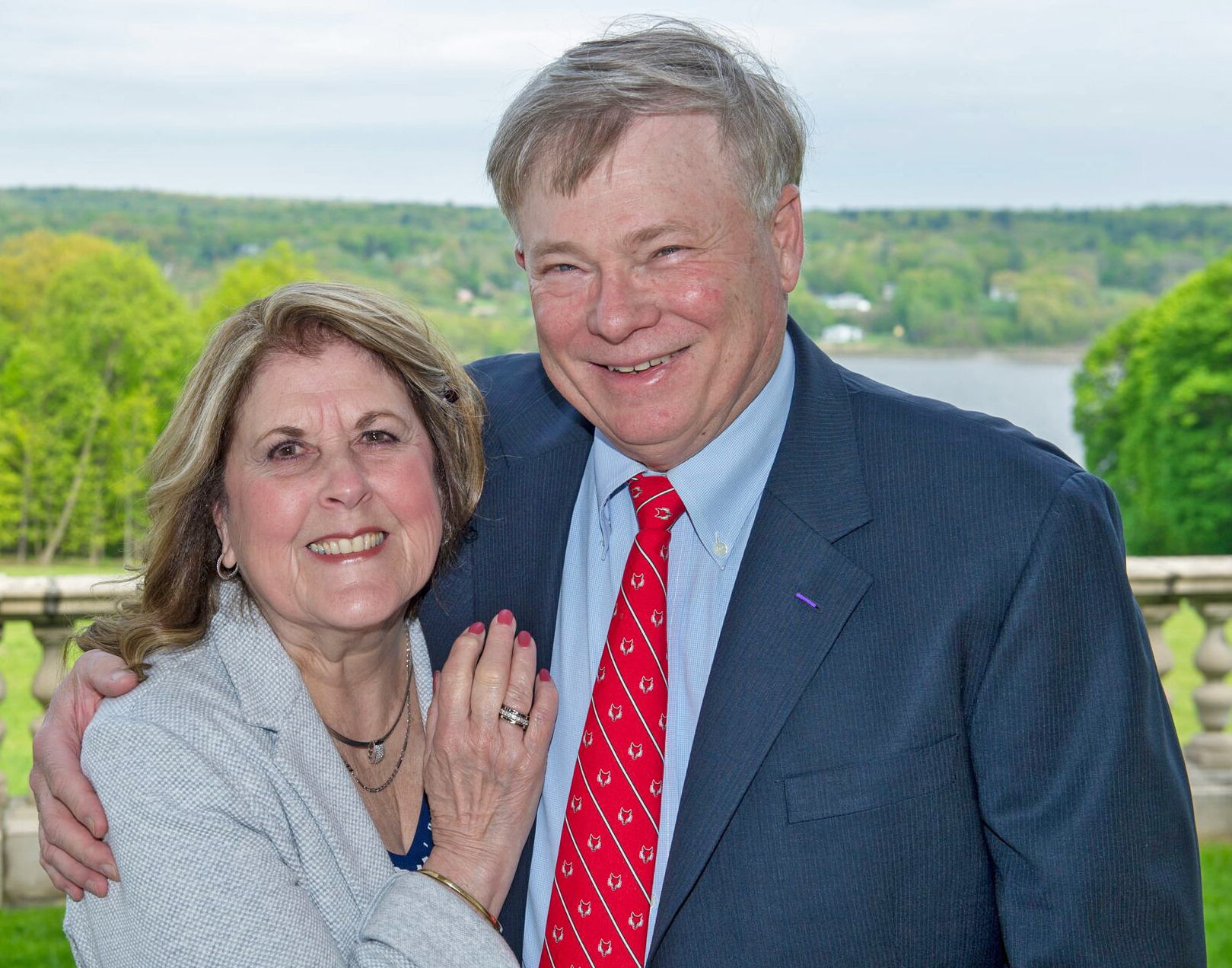
Looking back on two decades of serving students, heritage tourists, scholars, educators, environmental organizations, the business community, and the general public who seek to know more about a region that has been called "the Landscape that defined America."
The Hudson River Valley Institute, a Center of Excellence at Marist dedicated to studying the history and culture of the Hudson River Valley, celebrated its 20th anniversary throughout 2022 with a variety of programs and initiatives involving the Marist community and beyond.To mark the occasion, the staff at the institute wrote an article that appears in the spring 2022 issue of HRVI’s peer-reviewed journal of regional studies, The Hudson River Valley Review. The article highlights many of the organizations (including the National Endowment for the Humanities and the Hudson River Valley National Heritage Area), people, and programs of prominence during the first 20 years and features the evolution of HRVI’s website www.hudsonrivervalley.org, a digital resource that houses materials for researchers, educators, heritage tourists, and the general public. Further, the article recognizes the essential role of the nearly 200 Marist students who have completed internships since 2002.In celebration of the ever-growing group of Marist alumni who have completed an internship, HRVI has been featuring former students in a yearlong social media initiative on Instagram and Facebook. These updates have been seen by more than 20,000 people and show the variety of career paths that can come from the institute’s interdisciplinary internship experiences. In the interview-style spotlights, alumni reflect on the importance of their time at HRVI to their education and work, with careers such as teaching, library sciences, public history, and law all featuring prominently among the individuals recognized. Many intern alumni cite their experience as being a transformative time in their development from undergraduate students to job candidates and professionals, and their work with the HRVI staff as their first experience putting classroom education to use in a professional setting.In addition to a year of celebration, 2022 has also been a year of transition for HRVI. In conjunction with the retirement of Col. (Ret.) James M. Johnson, the institute’s founding executive director and Dr. Frank T. Bumpus Chair in Hudson River Valley History, HRVI launched an ongoing fundraiser to establish the endowed Dr. James M. and Lois S. Johnson Student Research Fund. The fund is designed to enable interns to undertake more impactful experiences and develop more in-depth projects as well as to allow students from a variety of economic backgrounds equal access to the enrichment potential that comes from a fully realized internship with HRVI.“From our beginning, interns have been the lifeblood of HRVI,” said Johnson. “Their work becomes part of HRVI’s publicly available content and provides them with valuable experience that prepares them for graduate school and for their careers. Lois and I have each spent many years as educators and as supporters of Hudson River Valley history, and we are deeply honored to have an initiative that combines both of those passions and bears our names.” To learn more about the Johnson Student Research Fund, visit www.hudsonrivervalley.org/johnsonstudentfund.On Aug. 20, 2022, at Marist’s historic Colonel Oliver Hazard Payne Mansion, HRVI staff, supporters, friends, and intern alumni gathered to formally mark the 20th anniversary of the institute and honor Johnson on his retirement. The program included remarks from HRVI Director Dr. Thomas Wermuth ’84 and Advisory Board Chair Alex Reese among others. Dr. Johnson received a Certificate of Appreciation from New York State Historian Devin Lander recognizing his many contributions to the study of the history of New York, with specific emphasis on his work studying the American Revolution. The guests included approximately 30 former interns dating from the very first group in 2002 through members of the recently graduated Class of 2022, many of whom met for the first time at the event.HRVI’s year of transition continued at the 11th annual Handel-Krom Lecture in Hudson River Valley History on Sept. 29, which was offered as the institute’s first program combining both in-person and virtual attendees after several years of successful programming that was offered online only. The lecture featured author Philip Dray discussing his recently published book, A Lynching at Port Jervis: Race and Reckoning in the Gilded Age. During the event, Wermuth announced HRVI’s Operations Director Andrew Villani ’08/’13MPA as the institute’s new executive director.A former student of Johnson’s and former intern at HRVI, Villani has been a member of the institute’s team since 2008, serving in several different roles.“Our 20th anniversary has been a great opportunity to look back at the early days and celebrate the contributions of our founders, early supporters, and many student interns who helped to get HRVI off the ground,” said Villani. “It has also given us a chance to look to the future and identify new opportunities to build on that growth and success in a meaningful way. I am thrilled and honored to guide the Hudson River Valley Institute into its next 20 years.”Planning is already underway for 2023. “We are already looking at the next round of articles for publication, projects for our internships, and speakers for our two major lectures,” said Villani. “Stay tuned for an exciting array of programs coming up in the near future!”Left to right are Alex Reese, chair of the HRVI Advisory Board; Dr. Thomas Wermuth ’84, HRVI director; Andy Villani, executive director; Col. (Ret.) James M. Johnson, Dr. Frank T. Bumpus Chair in Hudson River Valley History; Christopher Pryslopski, HRVI senior program director; Jason Schaaf, HRVI education coordinator; and Devin Lander, New York State Historian. Photo: Al Nowak/On Location Studios.Guests included approximately 30 former interns. In total, nearly 200 Marist students completed internships with HRVI since the establishment of the institute in 2002. Photo: Al Nowak/On Location Studios
28 Oct 2022
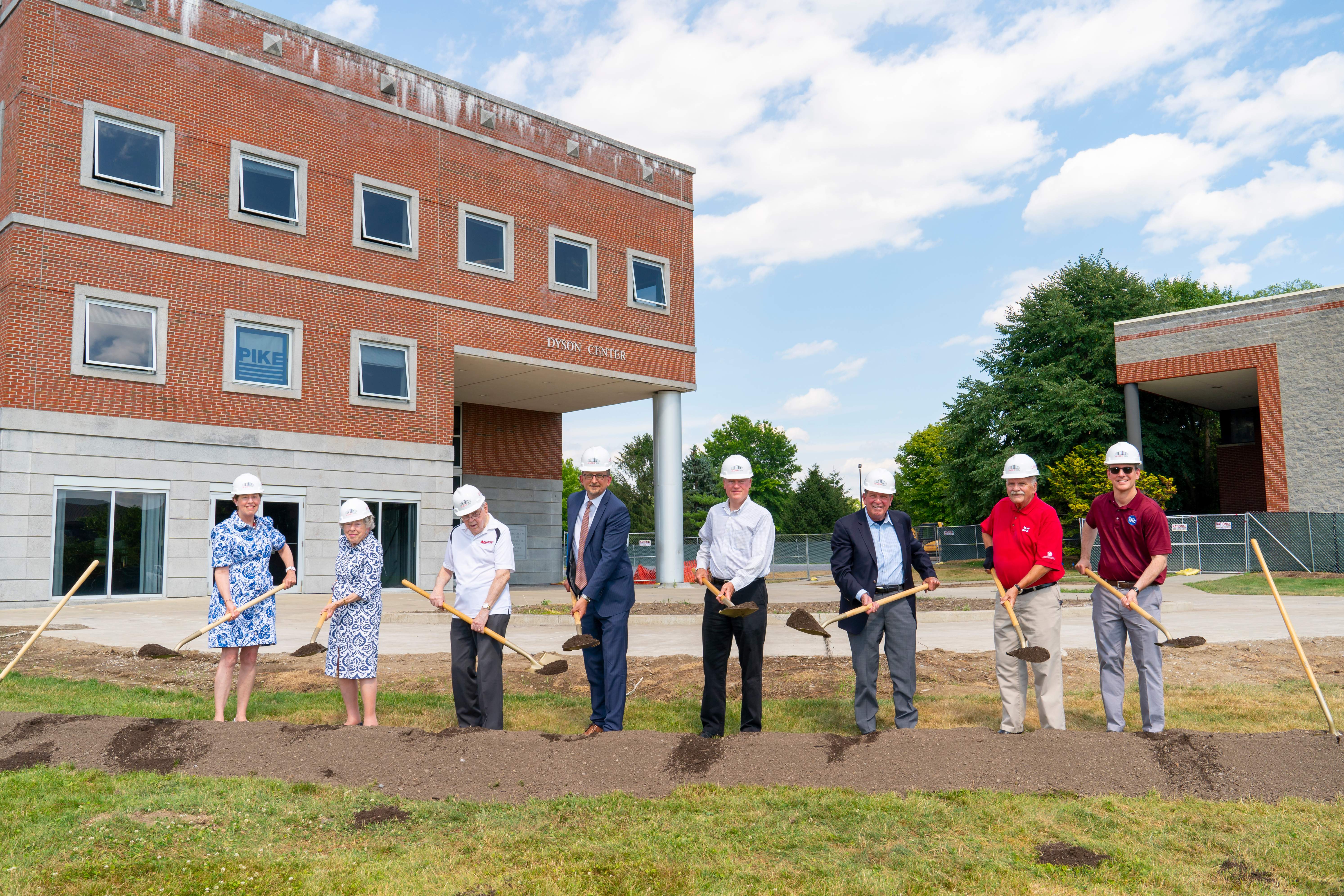
A reimagined home for the School of Management, School of Social and Behavioral Sciences, and Center for Career Services takes shape.
Marist College has officially broken ground on a major expansion and renovation of the Dyson Center, the home of the College’s Schools of Management and Social and Behavioral Sciences. Members of the academic administration, student body, and other dignitaries, led by Marist Trustee and Dyson Foundation Chair Rob Dyson, put shovels in the ground in July for the $60 million project, paving the way for a facility that will serve as a campus centerpiece and will double the size of the former building. The construction project is supported by a lead gift from the Dyson Foundation. Founded in 1957 and based in Dutchess County, the Dyson Foundation works to improve people’s lives through grant funding, promoting philanthropy, and strengthening the capacity of nonprofit organizations. The new Dyson Center, rendering courtesy of Ann Beha Architects, now Annum Architects."I have been in the unique position to watch the incredible growth of Marist over four decades," said Dyson, a past chair of Marist’s Board of Trustees. “It heartens me that the new Dyson Center will be a centerpiece of learning and collaboration for many years to come."The original Dyson Center opened in 1990. The expansion and renovation have been designed by the internationally recognized firm Annum Architects (formerly Ann Beha Architects). The new facility will feature state-of-the-art classrooms; faculty offices; a 150-seat tiered lecture hall; and labs for student–faculty research, especially in the areas of cognitive, developmental, and social psychology.The building will also boast a number of multipurpose collaboration spaces for student and faculty use and will incorporate many sustainable elements, reflecting the College’s long-standing commitment to the environment. There will also be expansive new common areas, including an atrium with a soaring ceiling, a café, a lounge, and abundant social and collaborative space.The Collaborative Study Center in the new Dyson Center. Rendering courtesy of Ann Beha Architects, now Annum Architects.The new Dyson Center will bring a wealth of new resources to the School of Social and Behavioral Sciences and the School of Management. Within the School of Social and Behavioral Sciences, teacher education students will have a new STEM classroom with an adjoining creative space. Psychology, criminal justice, and pre-law students will also be able to use unique learning spaces.The School of Management will include an expanded Student Investment Center with a professional trading floor providing the same technology found on Wall Street. It will also house the school’s Advising Center and the Bureau of Economic Research."The new Dyson Center will be an inspiring place for teaching, learning, research, and collaboration," said Marist President Kevin Weinman. "With its beautiful design, central location, and ample public space for socializing, group study, and individual work and reflection, students of all disciplines will benefit from this truly transformative facility. My sincerest thanks to Rob Dyson and everyone at the Dyson Foundation, Ann Beha, Marist’s Board of Trustees, and President Emeritus Dennis Murray for their work over many years to bring this vision to life.""The new Dyson Center will have specialized spaces for psychology labs, a mock courtroom, a command center, a therapy suite, a K–12 teacher training lab, maker space, and general classrooms configured to maximize current best practices for college instruction," said Dr. Deborah Gatins, dean of Marist’s School of Social and Behavioral Sciences. "I look forward to even more exciting faculty and student collaboration on projects and research.""For School of Management students, this building will create new opportunities to learn in an attractive environment," said Dr. Will Lamb, dean of Marist’s School of Management. "The classrooms are designed to allow our faculty and staff to adapt the layouts to the subject being taught. The new homes for our Investment Center and the Center for Career Services will help students prepare for and launch their careers in exciting new ways. The building will elevate the student experience and help us continue to attract the best and the brightest."The mock courtroom in the new Dyson Center. Rendering courtesy of Ann Beha Architects, now Annum Architects.The Center for Career Services, which offers a variety of programs and resources to assist Marist students and alumni in setting career goals and gaining employment, will also be housed in the Dyson Center."The Center for Career Services is incredibly excited about the new Dyson Center, along with its centralized location giving us a beautiful venue for hosting career and internship fairs, networking events, peer mentoring sessions, alumni/employer panel discussions, and more," said Mary Jones, executive director for the Center for Career Services. "We look forward to continuing to help Marist students achieve their career goals in this reimagined campus centerpiece."The new Dyson Center includes a number of environmentally sustainable initiatives including the adaptive reuse of the existing foundation and structure, highly insulated walls, a high-efficiency HVAC system, and a roof featuring living vegetation installed on top.The building is expected to open in spring 2024. For more photos of the groundbreaking and renderings of the design, visit marist.edu/dyson.A wide array of naming opportunities are available throughout the building. To learn more, please contact Chris DelGiorno, vice president for college advancement, chris.delgiorno@marist.edu
27 Oct 2022
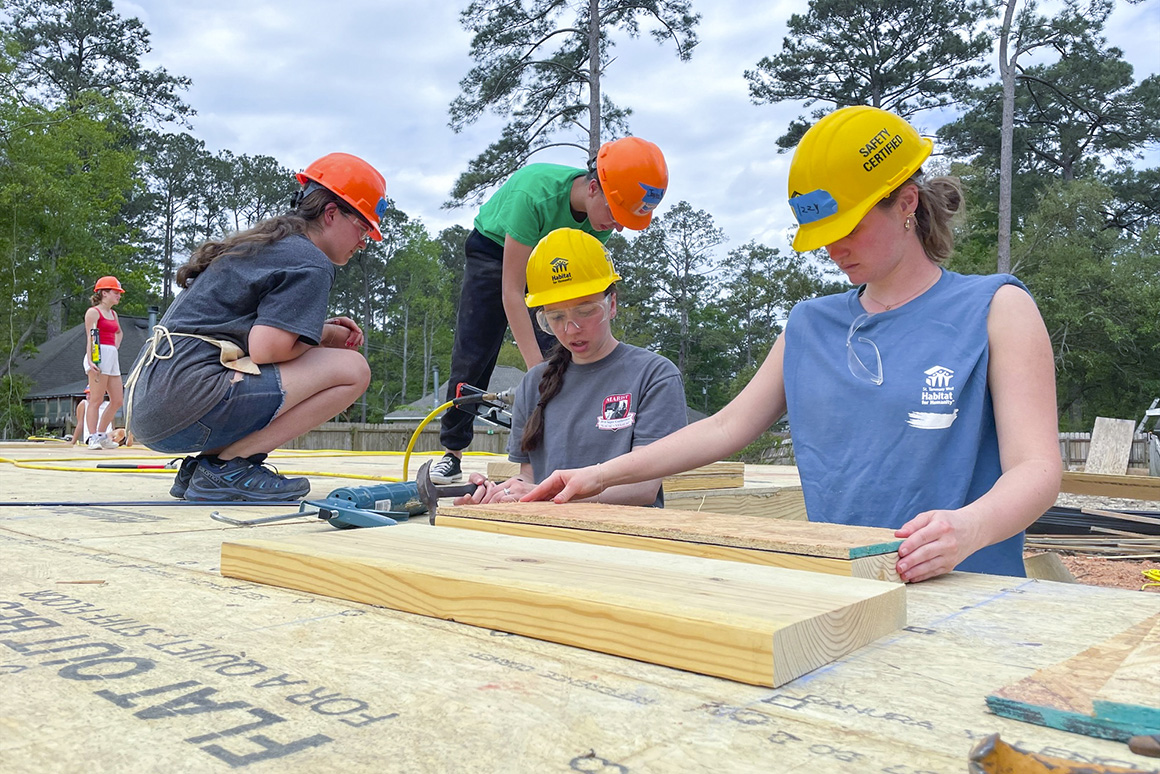
A group of Marist students dedicated their Spring Break to helping families in need.
The College’s Habitat for Humanity Club traveled to Louisiana, where 10 students, led by advisors, worked on building new homes near New Orleans.
13 Apr 2023
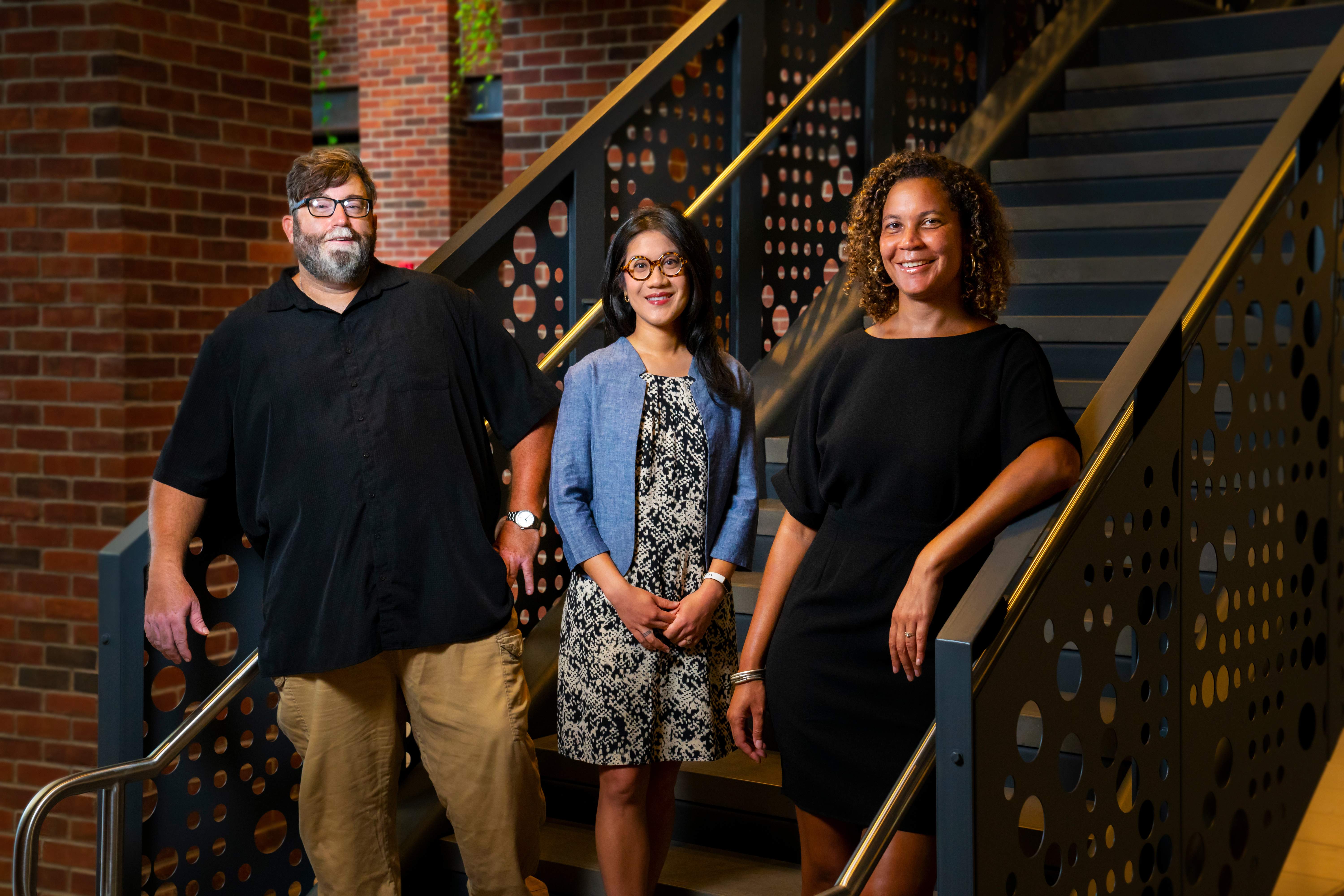
The Marist Mindset List, composed by a trio of Marist faculty, list focuses on a variety of academic disciplines where incoming students are making an impact, and its primary purpose is to give students, their faculty, and even their parents a sense of common ground to spark meaningful conversations, both in and out of the classroom.
The Class of 2026 has arrived, and this year’s group of incoming students has hit the ground running in hopes of being at the back end of the COVID-19 pandemic. This group comes to college having lived much of their high school years with disruptions and due to COVID-19 are looking for a sense of “normal.” This experience has been impactful to this new group of students, who like any incoming class, has a unique take on cultural references and interests.Each year, the Marist Mindset List is crafted as a “cultural compass” exploring the triumphs and challenges for incoming college students. Also known as the “always/never” list, the Marist Mindset List digs into topics spanning public health in addition to political, computer, and environmental sciences as well as fashion and diversity, and equity and inclusion. The list features 10 items in all, which include additional reading in the form of links to sources and, in some cases, living examples of items. Much of the Class of 2026 was born in 2004, so cultural references were entered with that in mind.The list is compiled each year by the Marist Mindset team of Tommy Zurhellen, associate professor of English; Dr. Vanessa Lynn, assistant professor of criminal justice; and Joyce Yu-Jean Lee, assistant professor of art and digital media.“The Marist Mindset List for the Class of 2026 is particularly interesting to me, because we’re seeing how incoming students react to the gradual end of the pandemic that has already affected their academic paths in so many ways,” said Zurhellen. “COVID may be waning, but COVID fatigue is still very much a factor in the choices our students make. This year’s list certainly reflects that unique trend.”“While every Marist Mindset List has explored what touches and impacts an incoming class, this year we also see how many of the phenomena listed impact so many of us,” said Lynn, Marist Mindset Faculty Fellow. “I'm excited about that, because the list can be truly intergenerational.”The annual Mindset List was created at Beloit College in Wisconsin to reflect the world view of entering first year students—and to help faculty understand incoming classes. In 2019, the list moved to Marist, becoming the Marist Mindset List. Under the direction of Zurhellen, who is a Beloit alumnus, the list has become a collaborative effort each year with Marist faculty and students from different disciplines with diverse backgrounds.The 2022 Marist Mindset List for the Class of 2026Sports CommunicationThe Class of 2026 has always known LeBron James as the most recognizable sports icon on the planet. LeBron James entered the NBA in 2003 and in 2004, the year many of the Class of 2026 were born, his jersey topped the best-seller list for the first time; in 2022, James’s jersey still tops the list.Political ScienceFor incoming students, Hillary Clinton has always had a more significant role in American politics than Bill Clinton. Although older Americans may think of Hillary Clinton as primarily First Lady from the 1990s, incoming students born in 2004 only know her as a United States senator, secretary of state, and contemporary presidential candidate.Computer ScienceCreated in 2004, Facebook has been active for the entire lives of the Class of 2026. Although Facebook is only 19 years old, many incoming students already see the social media platform as outdated, preferring newer platforms such as TikTok and Instagram.EthicsIncoming students are the first generation in 50 years who must include their own reproductive rights as part of their overall college decision. The recent Supreme Court decision to overturn Roe v. Wade will affect so many decisions for young women, who currently make up 59 percent of college students in America.Global StudiesThe Class of 2026 will be the first since the “Duck and Cover” generation of the Cold War to live with the real possibility of world war and global conflict. The Russian invasion of Ukraine echoes the experiences of growing up during the Cold War, but today’s digital technology makes the images of war much more visceral.Environmental ScienceThe debate on climate change is over. Incoming students are now the first generation faced with the omnipresent reality to actually effect change to combat global warming. Greta Thunberg has set the stage for youth activism; now, incoming students are part of a new generation increasingly demanding legal reforms to improve future generations’ lives. Diversity, Equity, and InclusionThe Class of 2026 is the first cohort in recent memory for whom knowledge about a diverse country and world is actually regressing. Thirty-five states have recently introduced and/or passed legislation to either ban or censor teaching about race, sexual orientation, gender identity, and American history in schools.Public HealthIncoming students are still recovering from the mental health impact of COVID and COVID fatigue. Mental health has been an issue for some time, but the Class of 2026 is still recovering from the effects of the pandemic on their mental health.EducationThe Class of 2026 is the first to realistically see the possibility of canceling or reducing student debt. The Biden administration has publicly announced its determination to tackle the rise of crippling student debt. Will they get results?FashionIncoming students are aware of fashion sustainability, but nevertheless social media and influencer culture draw them to cheaper and faster options from online retailers. Students have a better understanding of sustainability than previous generations, but their consumer choices do not reflect a strong commitment to protecting the environment.See a full breakdown of this year’s Marist Mindset List for the Class of 2026 here.
28 Oct 2022
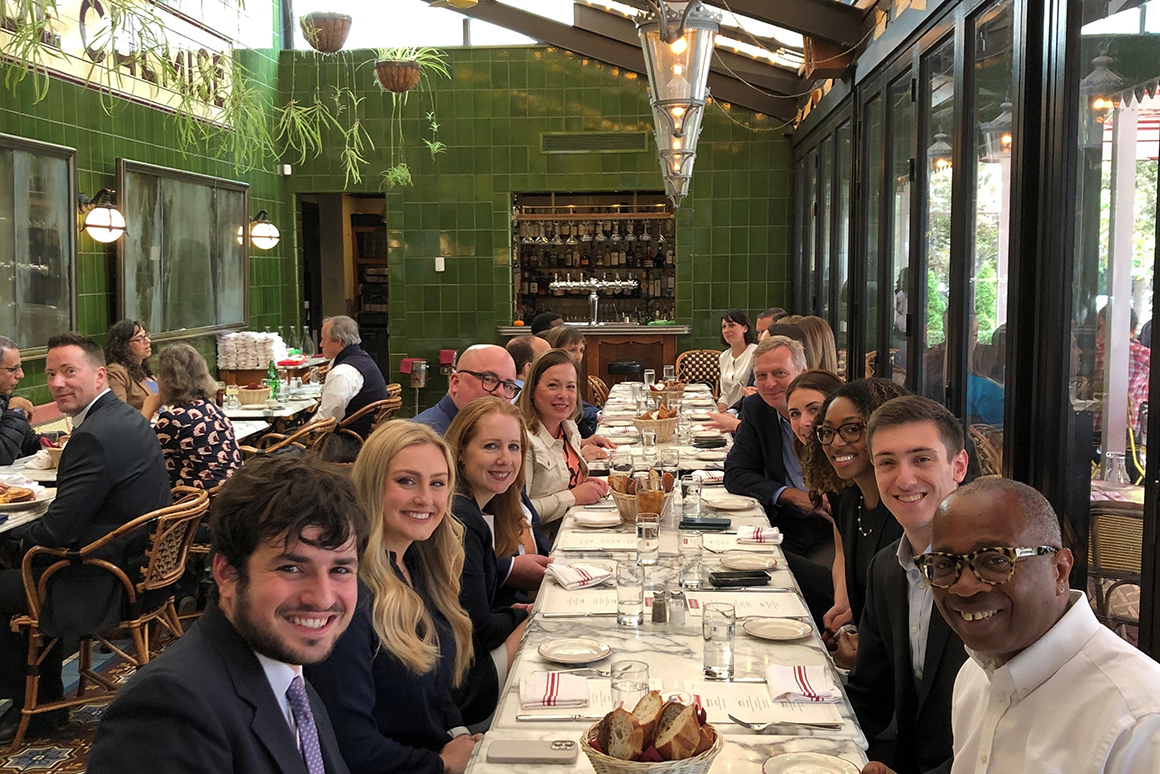
This past fall, the innovative Marist Poll team accurately measured the winners in Senate and gubernatorial contests across the nation, thanks to new, scientific polling methodologies.
This fall, the Marist Poll team tracked public opinion in the most hotly contested Senate and gubernatorial races across the country, and the results were spot-on! The Marist Poll accurately measured the winners in each of the called U.S. Senate and gubernatorial contests polled this election cycle. The Marist Poll’s success this year is the result of the implementation of new, scientific polling methodologies aimed at addressing the broader challenges confronting the polling community.Always innovators in the field of survey research and academia, the Marist Poll rigorously tested these methodologies during the year prior to the 2022 midterms, and the effort proved fruitful. The Marist Poll looks forward to sharing the insights from its election polls with the broader survey community as well as the hundreds of student workers, interns, and researchers who are at the fore of the Marist Poll Survey Center every semester.With an eye on the key issues driving the electorate, the Marist Poll also tracked the 2022 midterm elections with its national polling partners, NPR and PBS NewsHour. The NPR/PBS NewsHour/Marist Poll measured public opinion on President Joe Biden’s job performance, the economy, the labor force, and much more. In total, the Marist Poll conducted 12 public battleground state polls and 2 national surveys since Sept. 1, generating an estimated ad value equivalency of more than $300 million, according to the media monitoring service Meltwater.Also last fall, it was the Marist Poll’s distinguished pleasure to participate in the Office of College Advancement’s October event for the Washington, DC, alumni chapter. These two action-packed days began with an informal dinner with Marist President Kevin Weinman and distinguished political journalists with whom the Marist Poll has worked over the decades. The Marist Poll also hosted a luncheon where Marist Poll alumni had the chance to get to know President Weinman. The culmination of the trip was the broader gathering of Marist’s DC alumni chapter during which Dr. Lee Miringoff, director of the Marist Institute for Public Opinion, had the distinct honor of leading the discussion between Weinman and Marist’s best and brightest. From Marist students past to the present, undergraduates in Miringoff’s Political Communication and Politics course have, once again, experienced an insider’s view of the field. On-campus and virtual guest speakers this semester have included Congressman Jamie Raskin, author of Unthinkable: Trauma, Truth, and the Trials of American Democracy and who served as the lead impeachment manager in the second impeachment trial of former President Donald Trump; Lisa Desjardins, PBS NewsHour correspondent; Steve Thomma, executive director of the White House Correspondents Association; David Lightman, chief congressional correspondent for McClatchy; and Ron Brownstein, CNN senior political analyst and senior editor at The Atlantic.The Marist Poll would also like to take a moment to thank Marist alumni, staff, and friends of the College who contributed to the Marist Poll’s GiveCampus campaign. Those generous donations funded two student fellowship positions. The Marist Poll Summer Fellow for Distinguished Service in Media was awarded to Greta Stuckey ’23 who demonstrated outstanding journalistic integrity, exemplary writing and research skills, a passion for the media industry, and proven leadership ability. Sarah Knauss ’23 was named the Marist Poll Summer Fellow for Distinguished Service in Data Science which is awarded to a Marist College student who demonstrates exceptional analytical writing and research skills, exhibits a strong interest in the field of survey research and/or data analysis, and is a proven leader. For those who might have missed it, the Marist Poll, in conjunction with the Marist Center for Sports Communication, surveyed Americans about Title IX, 50 years after the passage of this groundbreaking legislation. To commemorate the anniversary of Title IX in June, the Marist Poll and the Marist Center for Sports Communication hosted a virtual panel featuring female luminaries in sports, broadcasting, and policy. Marist Poll Director of Data Science and Technology Stephanie Calvano ’04 moderated the panel which included Margaret Dunkle, architect of Title IX; Aditi Kinkhabwala, former national reporter for the NFL Network; Rebecca Lobo, WNBA and women’s college basketball analyst and reporter for ESPN and former WNBA All-Star; Jane McManus, executive director of Seton Hall’s Center for Sports Media; and Julianne Viani ’08, basketball analyst in sports broadcasting for ESPN, CBS Sports Network, NBC Sports, and YES Network, as well as other networks.
15 Feb 2023
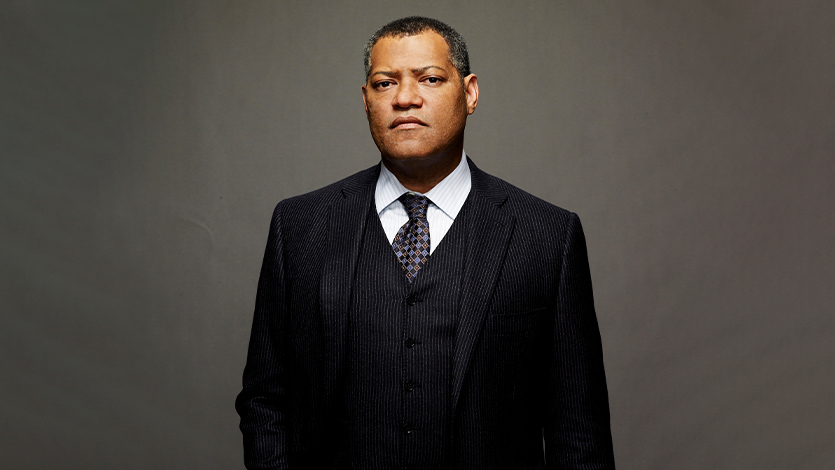
NYSAF will work with the College to lend professional expertise to its curricular programs as Marist students serve as interns and staff members.
New York Stage and Film at Marist College returns to Poughkeepsie July 14-August 6 for its 2023 Summer Season, which will feature a combination of emerging artists and Hollywood and Broadway headliners.
27 Mar 2023
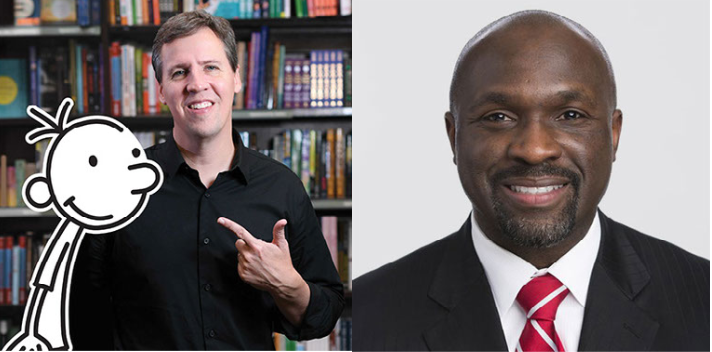
Best-selling author Jeff Kinney will address traditional undergraduates of the Class of 2023 at Marist’s commencement ceremony May 20 and adult undergraduate, master’s, and doctoral students will be honored the night before with Jerome Pickett ’98 as their commencement speaker.
Best-selling author of the popular Diary of a Wimpy Kid series and cartoonist Jeff Kinney will address traditional undergraduates of the Class of 2023 at Marist College’s Commencement ceremony on Saturday, May 20 on the Campus Green. Adult undergraduate, master’s and doctoral students will be honored the night before, with esteemed Class of 1998 Marist alumnus, Jerome Pickett, serving as Commencement speaker.
28 Mar 2023
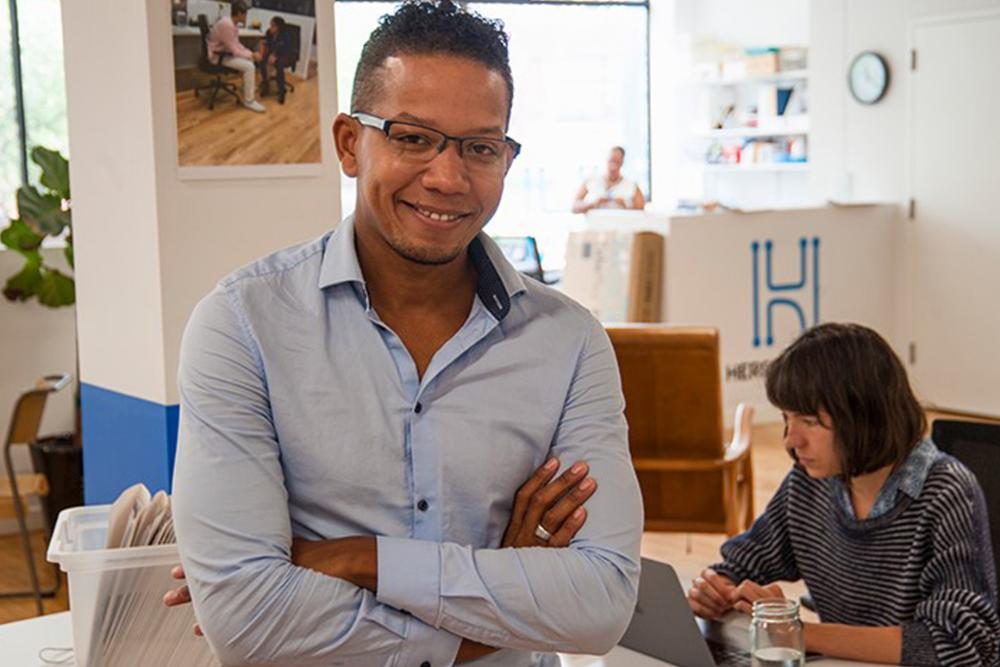
Marist alumnus Dr. Edward Summers ’04/’06M, founder of Bronx-based the Thinkubator, has been named to Robin Hood’s Power Fund, a new initiative supporting leaders of color and their organizations.
Marist alumnus Dr. Edward Summers ’04/’06M, founder of Bronx-based the Thinkubator, has been named to Robin Hood’s Power Fund, a new initiative supporting leaders of color and their organizations. Robin Hood, New York City’s largest poverty-fighting organization, funds impactful and scalable solutions to lift families out of poverty. The Power Fund invests in leaders who share Robin Hood’s mission of increasing economic mobility while championing racial and economic justice. Summers has dedicated his career to economic development in his hometown of the Bronx.To combat the barriers leaders of color face in accessing philanthropic dollars, the Power Fund takes a three-fold approach: a meaningful investment in an organization; targeted capacity-building and technical support; and a self-directed investment in the leader’s own development and elevation. The Power Fund was seeded with an initial investment of $10 million by Robin Hood and investors such as the Stavros Niarchos Foundation, BlackRock, and Capital One.In 2020, Summers founded the Thinkubator, an innovative nonprofit that provides education, career, and work-based learning opportunities for low-income youth in the Bronx. The Thinkubator harnesses their creativity through a youth-led design thinking consultancy, internships, workforce training, career development, job placement, a Youth Council, educational programming, and advocacy. With financial support from the Power Fund, the Thinkubator can now enhance and expand its work. Said Summers, “I am excited, humbled, and honored by this opportunity to elevate the work and impact of the Thinkubator. I look forward to the transformational impact this funding will have on our organization and on the youth and communities we serve.”A two-time Marist graduate, Summers served for seven years as Presidential Fellow and a member of the senior leadership team under Marist President Dennis J. Murray. He is currently on the College’s Alumni Executive Board as well as its Diversity & Inclusion Alumni Advisory Board.
21 Jul 2021
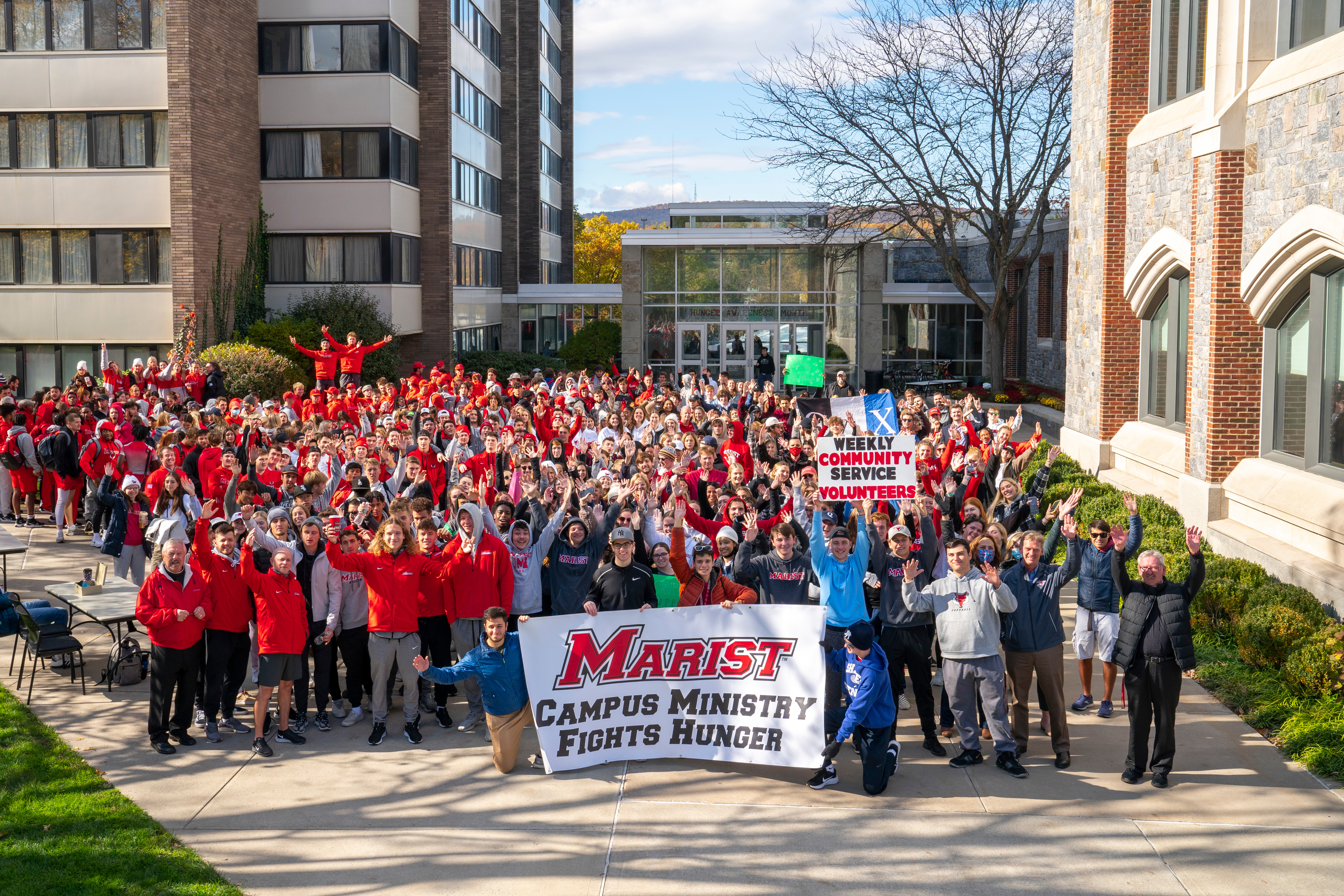
The Hunger Walk takes place for the 29th year.
On Nov. 3, Marist students continued the tradition of the Hunger Walk for the 29th year. The walk was part of Hunger Month, a program organized each November by Campus Ministry.More than 600 people took part in the approximately 30-minute walk around the campus. Students donated $3 each. A total of $1,167 was raised, according to Br. Michael Flanigan, FMS, who has coordinated the Hunger Walk for the past 13 years.Additional activities during Hunger Month include the collection of non-perishable food and Buck Hunger, the collection of donations of a dollar or more.The food is donated to the food pantry at Dutchess Outreach of Poughkeepsie. The cash donations are made to Bread for the World, Lazarus House (Lawrence, MA), the Guadalupe Middle School in Brownsville, TX, and the Lunch Box Soup Kitchen at Dutchess Outreach.
16 Nov 2021
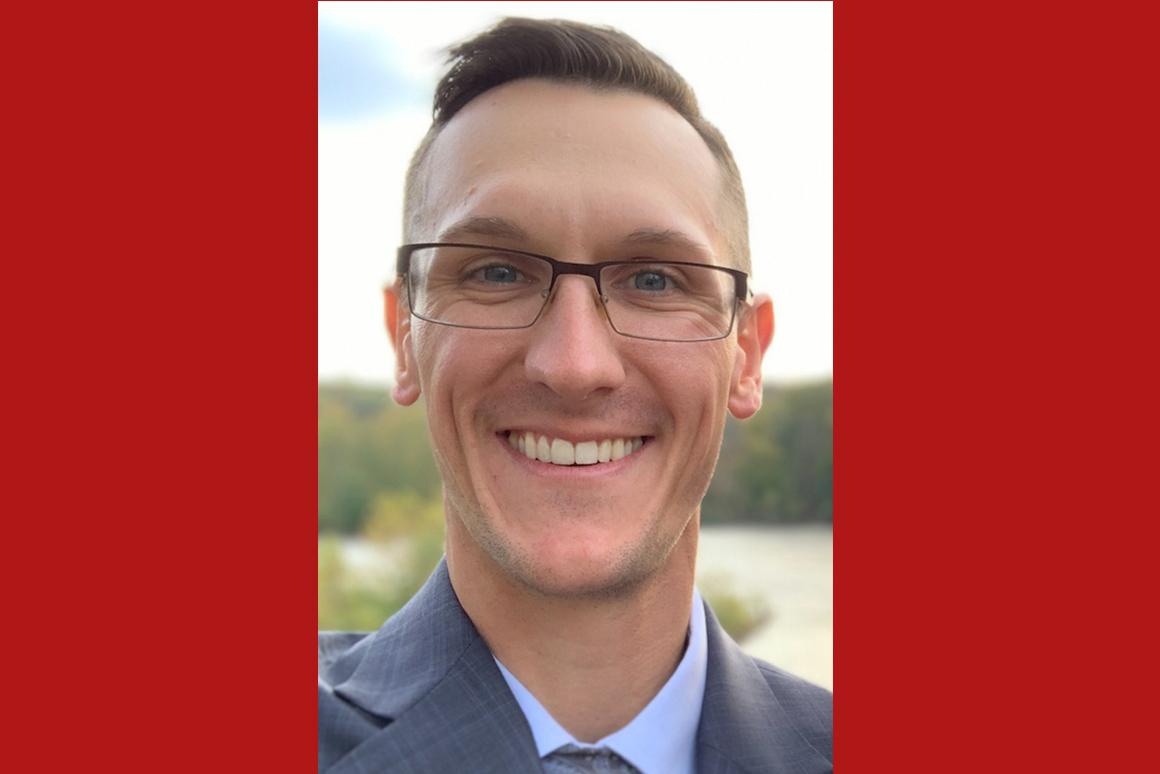
Matthew Szymaszek, DO, has been helping people fight the coronavirus from the outset of the pandemic.
Matthew Szymaszek, DO, has been helping people fight the coronavirus from the outset of the pandemic.The Simsbury, CT, native and long-distance runner for the Marist track and field team graduated in 2007 but returned to the College to finish research that he started with Dr. Zofia Gagnon, a former associate professor of environmental science, before taking the MCAT — the Medical College Admission Test, a standardized test that is part of the medical school admissions process — in 2008. He began medical school at the Lake Erie College of Osteopathic Medicine in Erie, PA, where he met his wife, Lindsey, in 2009. After originally settling down in Delaware, the couple moved to Colorado. In the fall of 2019 Szymaszek started working in critical care for Pulmonary Associates in Colorado Springs, CO. Just a few months later, the world was rocked by the coronavirus. In March 2020, his work environment started changing. “I don’t think there was a single non-COVID patient at one time, and we have a couple different ICUs,” he said about the period around Thanksgiving 2020. “I think one of our towers — 16 beds — was all coronavirus patients, all on ventilators.”As the weeks and months went on, more data and research showed that there were more than just respiratory issues to deal with, namely blood clots that formed in kidneys. Still, day-to-day responsibilities didn’t change all that much. Szymaszek’s routine, he said, consists of “seeing everybody, making sure their work of breathing hadn’t changed, making sure they didn’t develop any other secondary organ disfunction — particularly, any kidney dysfunction — and then it’s symptomatic management after that.” Workplace efficiency, Szymaszek explained, was the primary way his job changed. “Taking care of patients is the primary focus,” he said, “but certainly, you still have to document everything that you’re doing. I think that was the biggest time crunch — trying to see everybody, making sure you weren’t missing anything, making sure all the nurses’ needs were addressed, talking with families.” Since the information about the virus was so fluid, the latter task was time-consuming and difficult to address. Hospital procedures and operation plans were updated daily, primarily in the limitation of visitors at the hospital and how to avoid clutter in ICUs. Patients were admitted to higher levels of care only when their need for additional oxygen escalated. Szymaszek and the other doctors gave input to the hospital’s higher-ups as well as each other. “It was our anecdotal experiences day in and day out that we would share with one another and learn from those things,” he said. One experience that proved to be an astute observation by one of the doctors was the beneficial impact of steroids. Results in the Randomized Evaluation of COVID-19 Therapy (RECOVERY) trial involving hospitalized patients with COVID-19 showed that using dexamethasone over 10 days improved mortality.Learning from experience was a critical part of fighting an unknown enemy. “Our system as a whole, early on, developed a treatment algorithm as things were evolving and coming out of other countries,” Szymaszek said. The components of that algorithm have been and continue to be in flux. At first, they used convalescent plasma donations from recovered patients, which contain antibodies that can fight off the virus. Treatments that have been mainstays, Szymaszek explained, are steroids (such as dexamethasone and Solu-Medrol) and anticoagulation medicines, which help protect against blood clots.Of course, no treatments were discovered to be a magic wand. Steroids brought along problems in people with preexisting conditions, namely with blood-sugar levels. “That’s always been an ongoing battle…because they’re on high-dose steroids off and on for weeks and weeks,” Szymaszek said. “And if they have already have some underlying diabetes and other issues, it just becomes a nightmare to get those things under control.”Vaccines initially slowed the progression of cases and severity of disease, but the advent of the delta variant has only spurred more hospitalizations and unprecedented "crisis standards" of care for some hospital systems. “We continue to have a steady influx of patients infected with coronavirus not just from the local community but also from hospital systems both in and out of the state,” said Szymaszek. “In the beginning of the pandemic, most patients were hospitalized with COVID and there was a noticeable decline in other medical conditions such as stroke or cardiac conditions and even trauma-related cases. Now, we have an increase in both COVID and other medical conditions which is why trying to find open beds for some systems is a challenge. At this stage of the pandemic the vast majority of cases can be prevented with vaccination, and yes, there are going to be breakthrough cases as more people are vaccinated, but the chances of requiring hospitalization or death are incredibly reduced. “The science is constantly evolving and I think that's what is hard for people to understand. What we knew a year or a few months ago may not be true today as we continue to learn more about this virus and its variants.” Szymaszek has paved himself numerous different paths to unwind and get away from work. One of the reasons the Szymaszeks moved to Colorado was to be close to Lindsey’s family so that her parents could help watch their children. Another was that it offered them plenty of outdoor activities. It’s a gold mine for the outdoorsy couple, who live on the north side of Garden of the Gods Park, in the foothills of Pikes Peak Mountain, and within hours of numerous skiing resorts. Szymaszek likes hiking, biking, fly fishing, and taking his boys — six-year-old Owen and five-year-old Evan — walking on nature trails. “My boys are in school and a local mask mandate has dramatically cut cases and quarantines for students and teachers when compared to when it was optional.”Staying true to his roots as a long-distance runner, Szymaszek competes in time trials with his college teammates. The pool of competitors features Sean Hopkins ’05, Sean Prinz ’06, Justin Harris ’07, Michael Schab ’06, and Michael Rolek ’08. Out of boredom during quarantine time, Prinz proposed the idea of doing competitions to stay active. They would pick various events and share the results with each other.Head coach Pete Colaizzo ’86 remembers Szymaszek — or as he called him, CT, the abbreviation for his home state — as “one of the highest-mileage guys on the team,” he said. “Always ran a lot. Always ran twice a day — early morning runs, late night runs, in addition to our practices. He’s the type of guy you just want on the team.” Szymaszek continues to participate in triathlons and half Ironmans, with more races on the horizon this winter and spring. For him, running has always been more than exercise; it’s an emotional outlet.“I don’t think I would have been able to get through med school if it weren’t for the running,” he said. “That was the only thing that was consistent, [that] I knew I could rely on, to go out and clear my mind, think about stuff. That certainly still holds true now.”
21 Jul 2021
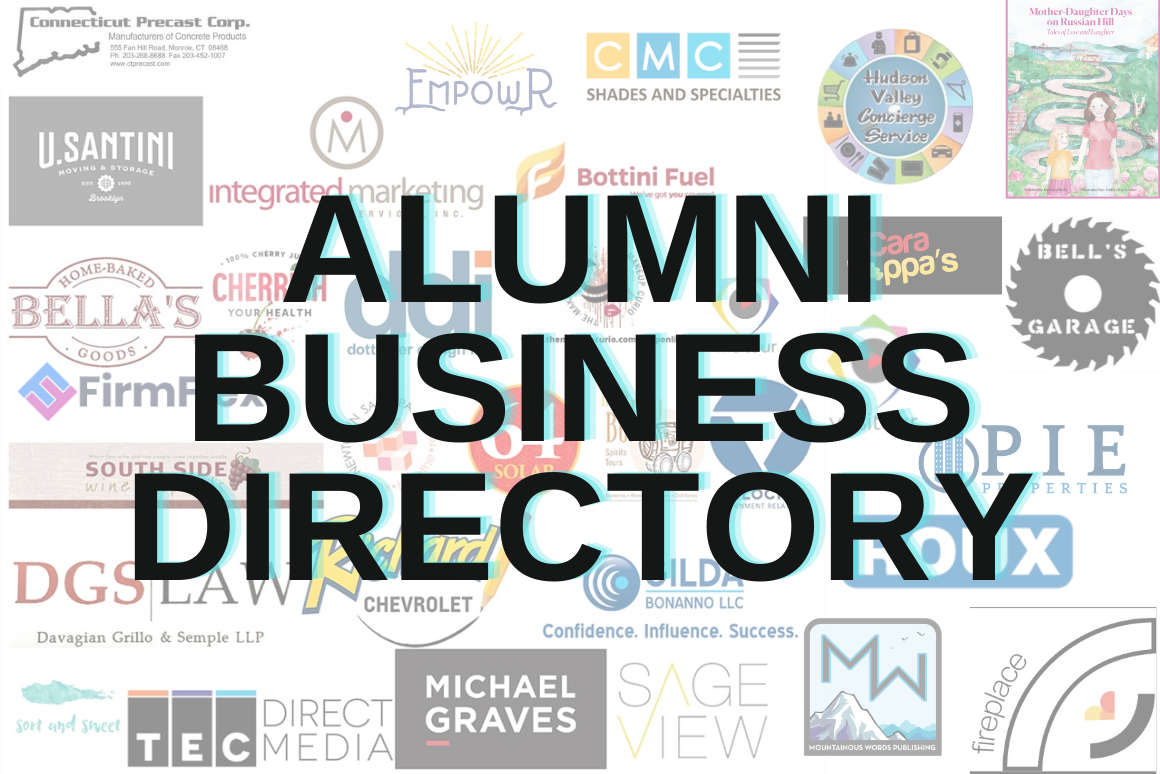
We are excited to offer this online directory of alumni-owned businesses for alumni to list their business and for fellow alumni to support alumni-owned businesses around the world.
We are excited to offer this online directory of alumni-owned businesses for alumni to list their business and for fellow alumni to support alumni-owned businesses around the world.If you are a Marist graduate and own a business or are a partner in a business and you'd like to include it in the business directory, click here to submit your listing.*The Alumni Office has the right to remove a business listing at any time. To search the Alumni Business Directory, click http://maristconnect.marist.edu/businessdirectory.*Terms of UseThe use of information contained within for solicitation or any reason other than supporting a business is strictly prohibited. Marist College does not endorse or make any other representations concerning any of the businesses registered in the Directory.
20 Aug 2021